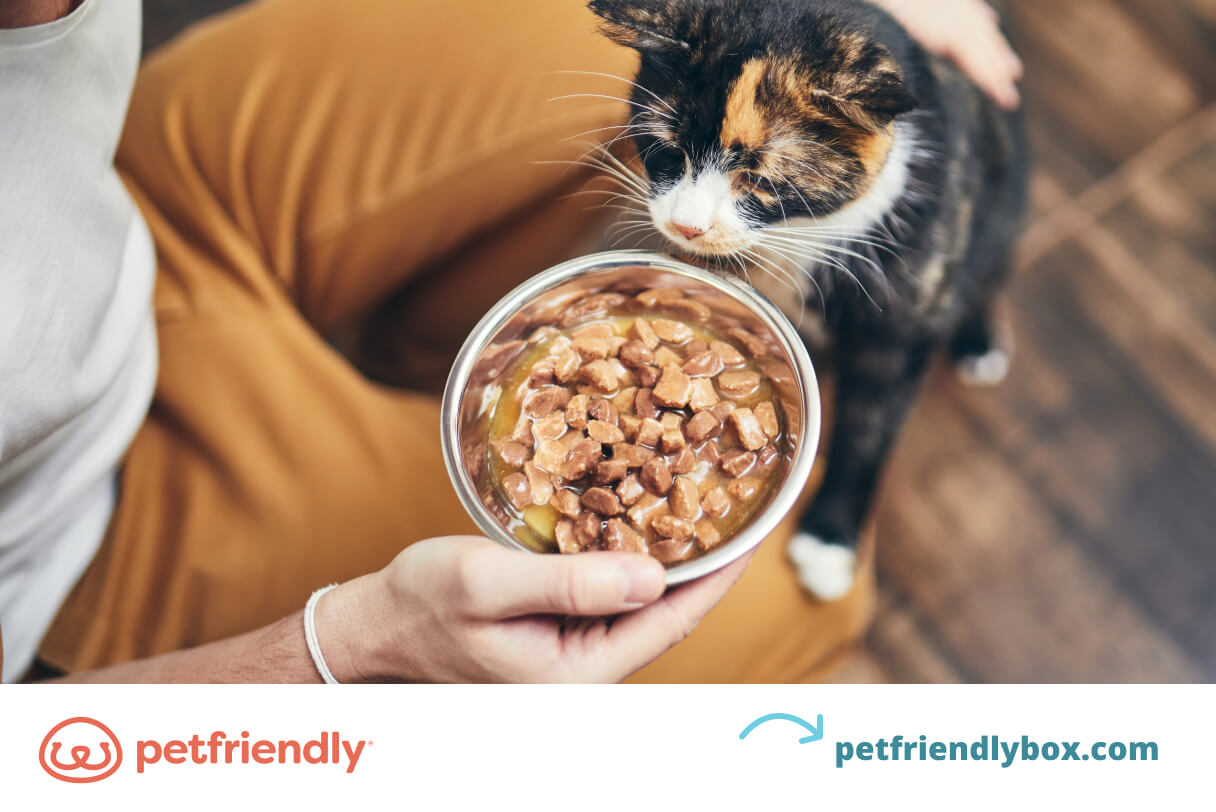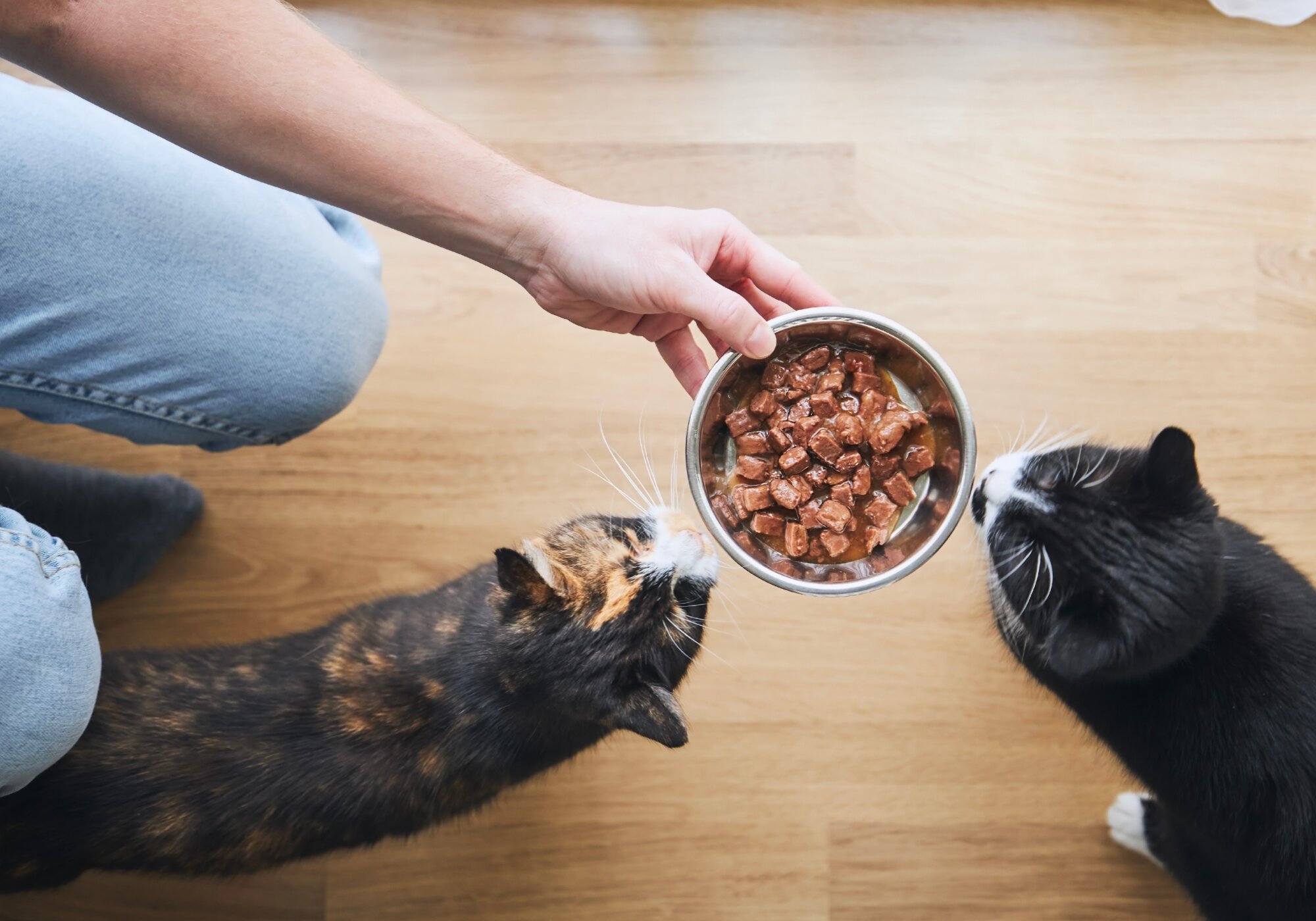Just like humans, cat nutrition begins with the right vitamins and minerals to develop and grow. Cat vitamins are essential for producing enzymes that help the body metabolize food and extract energy from it.
But not every cat is the same or has the same nutritional needs. So what vitamins do cats need to maintain good health and a long life?
In this article, we'll cover:
- Why vitamins are important for cats
- 10 essential cat vitamins and minerals
- Where cats get vitamins

Why are vitamins important for cats
Vitamins are important for your cat's health. And while your cat processes them similarly to how humans process vitamins, they have different nutritional needs.
Here's why vitamins are important for cats:
1. To stay healthy.
Your cat needs essential vitamins to effectively grow and develop. Cat nutrition starts with a complete and balanced diet with cat food that contains the right nutrients. Vitamins promote:
- Healthy skin, hair, and nails
- Strong bones
- Gut and digestion
- Immunity for adult cats
2. If they are picky or have specific dietary needs.
Feeding your cat a vegetarian diet or have an adult cat who needs extra support in their old age? They may be lacking a source of important vitamins. This is also true for cats who have a particularly sensitive palate.
If your cat prefers one animal protein over another, they might not be getting the nutrients from consuming cat food. This includes cat vitamins or minerals like vitamin B2 or calcium that are necessary for proper growth and development.
3. If they have a vitamin deficiency.
Your cat needs vitamins in small quantities to function the right way. But, if they don’t properly absorb enough vitamins through cat food or supplements, their health could suffer. Vitamin deficiencies can lead to hypovitaminosis, heart disease, and brain aneurysms.
If you're not sure how to tell if your cat is lacking vitamins, look for the following signs:
- Lack of energy
- Dandruff
- Dull coat
- Dry, brittle nails
- Hair loss
4. To prevent disease.
In addition to health benefits, vitamins boost your cat’s immune system so that they don't catch colds as easily. Vitamins can also help prevent diseases like feline asthma and diabetes.

10 vitamins and minerals cats need
Vitamins are substances that are essential for good health. They provide the energy and nutrients required to sustain normal physiological functions.
Cats need various nutrients from carbohydrates, animal protein, and fat. But, some vitamins aren't produced within the cat's body and must be ingested through their cat food.
Vitamins can be broken down into two categories — fat-soluble and water-soluble.
- Fat-soluble vitamins include A, D, E, and K
- Water-soluble vitamins include C and B complex vitamins
Most cats only need trace amounts of fat-soluble vitamins — less than 100 mg per day. This is because they can store these nutrients in their livers until they need them again later down the road.
Here are 10 nutrients cats need in their cat food and supplements.
1. Vitamin A
Vitamin A is an essential nutrient that helps maintain healthy vision, skin, and bones. It's also vital for reproduction and cell growth. Great sources of vitamin A include eggs, cheese, and fish oils. However, the best source of vitamin A is beta-carotene found in carrots, spinach, and sweet potatoes.
For cats who don't eat these foods regularly, vitamin supplementation may be required. This is also true for cats with allergies or kidney disease where food intake needs to be restricted. Cats require only small amounts of vitamin A compared to dogs.
2. Amino acids
Amino acids are the building blocks that makeup protein. While amino acids aren't considered a vitamin, they do need to be obtained through your cat's diet. And cats require 22 different types of essential amino acids — 11 of which are synthesized in the cat's body.
Cats need higher protein and amino acid levels than dogs because they break them down quickly. And, they are unable to adapt if their amino acid levels (such as taurine) are low.
3. B Vitamins
Vitamin B is essential for making red blood cells, which carry oxygen around the body. It’s also important for the health of the nervous system and for your cat to produce antibodies that fight infection.
The most common deficiency of B vitamins in cats is anemia. But in some cases, it can also cause neurologic problems and behavioral changes like aggression or depression. Most vitamin B deficiency symptoms look like this:
- Lethargy
- Little to no appetite
- Hair loss or alopecia
- Diarrhea
- Pale gums
If your cat displays any of these symptoms, always consult with your veterinarian.
Common B vitamins include:
Vitamin B1 (Thiamine)
Vitamin B1, or thiamine, is a water-soluble vitamin that metabolizes carbohydrates for energy. It's one of the most important essential cat vitamins. Unfortunately, many commercial cat foods and raw diets don't contain the right amount to meet your cat's nutritional requirements.
Vitamin B2 (Riboflavin)
Vitamin B2, or riboflavin, also helps break down carbohydrates as an energy source for your cat. It also breaks down fats, improves oxygen supply, and promotes good skin and coat health.
Vitamin B5 (Pantothenic Acid)
Vitamin B5 is found in animal protein like beef and organ meat like liver. It's a great anti-stress vitamin and helps your cat metabolize fat, protein, and carbohydrates into energy.
Vitamin B6 (Pyridoxine)
Vitamin B6 or pyridoxine is a necessary nutrient for your cat's brain function and overall development. It is normally found in protein-rich cat foods like tuna or dairy.
Vitamin B12 (Cobalamin)
Vitamin B12 is an essential vitamin for your cat. Found in animal proteins like meat, liver, and fish — B12 or cobalamin supports your cat's immune, digestive, and nervous systems.
Biotin (Vitamin H)
Biotin is the hair, skin, and nails vitamin, but it's also good for treating skin allergies, supporting digestion, and building muscles. Most cat foods contain the right amount of biotin for your cat. But, if your cat eats a raw diet ensure it's filled with protein and nutrient-dense whole grains.
4. Vitamin C (Ascorbic Acid)
Vitamin C is a powerful antioxidant that is synthesized through the liver. It plays a major role in the immune system and helps to form collagen. Collagen is the connective tissue that supports the skin, bones, and blood vessels.
Some other benefits of vitamin C include:
- Wound healing
- Infection protection
- Promotes bone health
- Tissue growth
- Immune regulation
- Disease prevention
- Teeth and bone formation
In extremely rare cases, your cat may suffer scurvy. Scurvy is a disease caused by a lack of vitamin C.
Vet Tip
Vitamin C aids iron absorption. If your cat eats too much poultry they might develop iron deficiency anemia. This is because poultry contains tannins that inhibit their absorption into the body. However, feeding your cat some spinach alongside their cat food will help prevent this from happening.
5. Vitamin D
Vitamin D is known as the "sunshine" vitamin, so for indoor cats, vitamin D deficiency can be a problem. Vitamin D is important for strong bones and teeth. And, it also helps regulate your cat's:
- Immune system
- Muscle function
- Nerve support
Vitamin D is essential for the absorption of calcium and phosphorus into bone tissue. This makes it especially important for cats who are growing, such as kittens and pregnant or lactating female cats.
If you have an outdoor cat they are likely receiving appropriate amounts of vitamin D through sun exposure. Plus, most cat food should have enough nutrients to cover their daily dose.
6. Vitamin E
Vitamin E is a fat-soluble vitamin that acts as an antioxidant. It is needed for immune support and the production of cell membranes. The best source of vitamin E is beef liver. Your cat can also obtain vitamin E from sunflower seeds, wheat germ, nuts, and seeds.
Some benefits of vitamin E for cats include:
- Better eyesight
- Shiny coat
- Improved cardiovascular health
- Boosted muscular support
7. Fatty acids
Essential fatty acids are polyunsaturated fats that are not produced in your cat's body. They must be consumed through diet. They are needed for the production of hormones and cell membranes.
There are two types of essential fatty acids that are key for your cat's well-being — omega-3 and omega-6. They are often found in fish oil. This can usually be given to cats as a supplement or through the food they eat.
Omega-3 and omega-6 help keep cats fit and healthy in addition to:
- Supporting skin health and coat quality
- Reducing inflammation in the body
- Improving digestion
- Maintaining healthy immune function
Omega-3
Omega-3 keeps your cat’s skin healthy by reducing inflammation and redness caused by allergic reactions from cat flea bites or food. Omega-3 fatty acids help maintain your cat’s heart health by:
- Reducing blood pressure
- Reducing cholesterol levels
- Improving circulation
- Preventing blood clots
Omega-6
There are 6 acids that make up the omega-6 fatty acids. All have been shown to have anti-inflammatory properties. Omega-6 is a natural antihistamine that helps reduce symptoms caused by allergies or exposure to allergens like pollen. Some signs include:
- Sneezing
- Coughing
- Runny nose
Even though omega-6 can decrease inflammation associated with asthma attacks, too much can actually cause inflammation. Consult with a vet before administering to your pet.
8. Vitamin K2
Vitamin K is a fat-soluble vitamin. There are three types of vitamin K — K1, K2, and K3. K2 is found in fish meal and is required for healthy bones and teeth. However, it is created in the intestine so it usually isn't needed as a supplement for your cat.
9. Macrominerals and Microminerals
Minerals are different from vitamins in that they hold their structure when consumed. Cats can obtain minerals easily and don't need as much to stay healthy.
The most common minerals that cats need include:
- Calcium
- Copper
- Iodine
- Iron
- Manganese
- Magnesium
- Phosphorous
- Potassium
- Selenium
- Sodium chloride
Minerals can be separated by the amount your pet needs. Macrominerals are required in larger amounts and include calcium, chloride, magnesium, potassium, phosphorus, sodium, and sulfur. The major microminerals your cat needs include iron, zinc, copper, and selenium.
Overall, dogs need more mineral counts than cats. So be careful about giving your cat too much of either type like magnesium (macromineral) or iron (micromineral).
10. Probiotics and Prebiotics
When we talk about cat food and supplements, it's important to know that cats are carnivores and can't digest plant fiber. This is why probiotics are important.
Probiotics help your cat synthesize vitamins, absorb minerals more effectively, and also stimulate good gut bacteria.
- Probiotics are live microorganisms that offer health benefits when consumed by humans or animals.
- Prebiotics are non-digestible carbohydrates that promote the growth of probiotic bacteria in your cat’s gut.
Probiotics can usually be found in pill or chew form, but there are also ways to supplement with certain foods. Yogurts contain live active cultures that help your cat produce enzymes for digestion and protection against bacteria.
Probiotics and prebiotics have several benefits for cats:
- Stimulates their appetite
- Prevents hairballs
- Boosts the immune system
- Promotes digestive health
- Improves food allergy symptoms
- Helps with IBD

Where can cats get the vitamins they need

Most cats need additional nutrients in their diet, and oftentimes, food. In general, giving your cat foods that contain essential vitamins and nutrients is the best way to meet their nutritional needs.
But there are other ways to support your cat's nutrition, body, and growth. If your cat has a unique nutrition plan or diet they may need help getting the right amount of nutrients.
Cat food
Giving your cat the right vitamins starts with a complete and balanced diet. A healthy diet for your cat should include fats, carbohydrates, and animal protein (like meat, fish, or poultry).
Many quality commercial cat foods contain the right vitamin sources and amounts needed to support your cat's nutritional needs. Check that your cat's food has passed safety standards from the feed control officials (AAFCO).
- AAFCO sets the standard for ingredients and nutritional requirements for commercial pet food. They enforce nutrient counts to be balanced for your cat's body at every life stage — from kitten to adult cat.
- The FDA, similar to AAFCO, regulates the quality of ingredients and nutrients from meat and poultry to calcium and sodium.
If you're still unclear about your cat's food or nutrient intake, consider reaching out to your vet.
Human food
While most cat food is packed with everything your cats need, you may be interested in some nutritional cat treats.
Here are a few vitamin-rich food sources to treat your cats:
- Spinach
- Protein (fish, poultry, beef)
- Fats (fish oil)
- Eggs
- Yogurt
- Melon

Cat vitamins and supplements
Cats get most of their vitamins and minerals from the food they eat. But, if they aren't getting the vitamins or minerals that cats need, they may need additional support. That's why cat supplements are important.
The amount you will need to give your cat depends on their cat food, life stage, and medical history. If your cat has a medical condition, talk to your vet about the best way to supplement your cat's diet.


